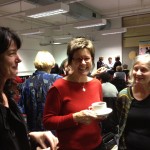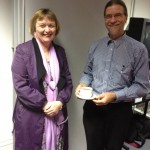 “Too much belly dancing,” is a cry often heard from government as a justification for cutting funding to adult education but at yesterday’s Forum on the Future of Adult and Further Education in Melbourne, presenter Barry Golding said that these kinds of digs at adult learning were a “cheap shot” and displayed a fundamental lack of comprehension at the deeper value that non-vocational or ‘for interest’ courses can bring to our communities.
“Too much belly dancing,” is a cry often heard from government as a justification for cutting funding to adult education but at yesterday’s Forum on the Future of Adult and Further Education in Melbourne, presenter Barry Golding said that these kinds of digs at adult learning were a “cheap shot” and displayed a fundamental lack of comprehension at the deeper value that non-vocational or ‘for interest’ courses can bring to our communities.
In 2002, Professor Golding, President of Adult Learning Australia, conducted a project for the ACFE board, researching students of belly dance at the Camperdown Adult Education Centre and found substantial benefits to their health and social cohesion. “Several of the women had moved to the area after significant setbacks in their lives and the belly dancing course provided a place to explore new identities with a wide range of women. In the process of dancing, they talked about their lives in a way that was transformative and that flowed on to their families and the wider community. It also provided a springboard to get more involved in the learning centre and move onto courses that lead to other forms of paid work,” says Golding.
“Courses such as this one have the capacity to save governments money on a wide range of often much more expensive professional support services. In this sense, belly dancing can be seen as a valuable community investment rather than a cost,” says Golding.
 The forum, convened by Adult Learning Australia, was held in response to the $150 million budget cuts to TAFE announced in the Victorian state budget last May. In the publicity surrounding the biggest cuts to Victorian TAFEs ever, much of the focus has been on trades skills education. The fact that TAFEs, along with the Adult and Community Education (ACE) providers are where many adult Australians complete their secondary education has, for the most part, been ignored in the debate so far.
The forum, convened by Adult Learning Australia, was held in response to the $150 million budget cuts to TAFE announced in the Victorian state budget last May. In the publicity surrounding the biggest cuts to Victorian TAFEs ever, much of the focus has been on trades skills education. The fact that TAFEs, along with the Adult and Community Education (ACE) providers are where many adult Australians complete their secondary education has, for the most part, been ignored in the debate so far.
In his opening address, Golding offered a sobering picture of Australia’s education system “We’re well behind the world leaders in education,” he says “We’re the only OECD country whose results have not increased since 2000.”
Golding warns that the decision to cut funding to 80 percent of TAFE courses will severely impact thousands of adults completing their basic education. Many other Victorian’s, mainly from underprivileged backgrounds and regional communities, will also be denied the chance to complete their secondary education and attend university.
“50% of adults lack literacy levels required to work in today’s knowledge economy,” says Golding. TAFE provides essential education for the 46 percent of Australian adults lacking the basic literacy and numeracy skills to meet the complex demands of everyday life, such as the ability to read newspapers, understand medical advice or use train and bus timetables.
Golding describes how the budget cuts will mean the loss of virtually all of the TAFE programs in the Ballarat Arts Academy’, which has been going for 150 years and laments what this will mean for the cultural and aesthetic life of his community. “The world would be a sick, sad and sorry place if all we had was vocational competencies,” he says.
The link between learning and wellbeing was a key theme of presentations at the forum and one that presenters said that governments had repeatedly failed to understand.
Second speaker, John Pardy, Senior lecturer in the School of Education Monash University, spoke about the social and educative value in delivering programs that are not vocational. Like Golding, he singles out the arts; “Over the past twenty years ceramic rooms and courses have closed in almost every TAFE,” he says. “We don’t have policy makers who understand how much producing or making things contributes to people’s sense of the world—it’s too much of a conceptual leap.”
Presenter, Dr Hernan Ignasio Cuervo has recently published a book. ‘Life Patterns’ based on a longitudinal study of young people in rural Australia exploring how the subjects have used education to achieve their goal. He also agrees that the “connection between educational and health is becoming stronger and stronger.”
“We found that living rurally or regionally is as intrinsic to people’s identity as being African American,” he says. He described how closures of regional TAFEs will force young people to migrate to the city. This not only puts strain on city services (transport, housing, infrastructure) but also weakens rural communities by removing their young people and knowledge resources. It is also in direct contravention of other government policies goals to strengthen rural communities.
All speakers acknowledged that the lack of a whole-of-government approach to funding adult education sector is detrimental.
Fourth presenter Lindee Conway, Secretary of the Australian Council for Adult Literacy, points out that part of the problem is that the ACE sector is too good at achieving great outcomes on minimal budgets and this sends a message to government that they don’t need to increase finding; “people working in community education have not taken a vow of poverty,” she says.
Final speaker Dr Michael Hallpike, Victoria University, spoke about the courses that TAFE offers to create credit-bearing pathways into the higher education. About 15% of Victorian university students are selected for bachelor degrees via TAFE pathways and similar programs. This avenue to tertiary education will be closed off for many, particularly in regional Victoria where TAFEs often provide the only route to university.
Michael shared the story of an 82-year-old woman who had recently completed her PhD, having begun with a basic computer course as an adult learner. For her and many other learners that Michael describes, the outcomes are not about jobs, but about learning for social, civic, political and historical engagement; learning to be “part of the conversation,” and he calculates that the value of this kind of learning is “beyond figures.”
The Victorian TAFE system has been one of the flagships of the sector nationally, and internationally. As a result of the Victorian Government budget cuts, Victoria faces an uncertain future in critical areas of adult and further education with fragmented delivery, an unreliable and largely unregulated private for-profit sector, and TAFE institutes not funded to provide support and services across the community. The cuts that TAFEs will be required to make will impact student services, facilities such as libraries and computer access, and many other community service obligations.
